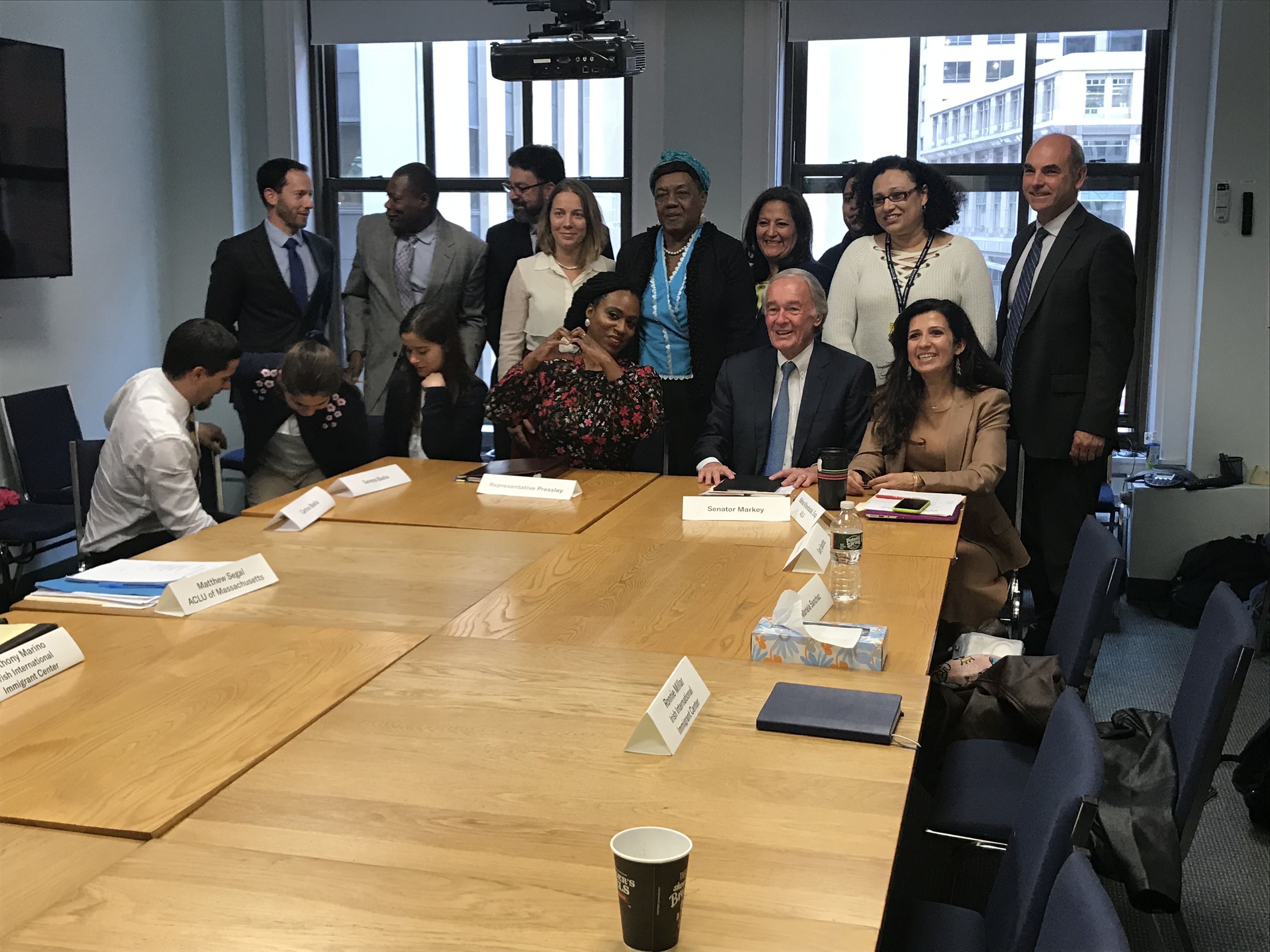Rep. Ayanna Pressley and Sen. Edward Markey hosted a roundtable discussion on immigration policies. Photo by Max Reyes
Rep. Ayanna Pressley and Sen. Edward Markey on Monday questioned how the Trump administration was handling about 400 requests for medical deferred action that were reopened after the administration walked back an attempt to end the practice.
The two spoke on the topic during a roundtable discussion held in the American Civil Liberty Union (ACLU) of Massachusetts’ office in Downtown Boston. The conversation included immigrants, immigration lawyers and other advocates and stakeholders.
After an attempt to discontinue medical deferred action in August became national news and drew criticism from members of Congress, the practice was reinstated on Sept. 2.
Medical deferred action allows immigrants seeking medical treatment to remain in the country beyond what would usually be permitted based on their visa or immigration status.
Pressley said during the roundtable that none of the roughly 400 reopened requests had received approval since Sept. 2. Even so, Pressley called the resumption of the practice “a victory,” albeit one that was difficult to secure.
“I think this moment is a reminder that despite how sobering or challenging the landscape,” Pressley said, “that when we fight, we can win.”
Markey said the administration’s attempt to discontinue the practice was a “new low.”
“This administration literally was going to turn its back on kids with cancer and to deport them out of the United States,” Markey said.
Markey also noted that United States Citizenship and Immigration Services (USCIS), which is in charge of processing the deferred action applications, has failed to respond to a letter signed by more than 100 members of Congress and sent to the agency on Aug. 30.
When asked to confirm that none of the applicants had received approval notices, USCIS said it had made “no additional announcements” on the matter. USCIS last issued a public statement related to medical deferred action, which it refers to as “non-military deferred action,” on Sept. 2.
“At the direction of Acting Secretary McAleenan, USCIS is resuming its consideration of non-military deferred action requests on a discretionary, case-by-case basis,” a USCIS spokesman said via email, “except as otherwise required by an applicable statute, regulation, or court order.”
According to USCIS, there is no official medical deferred action program.
Mahsa Khanbabai, the chair of the New England chapter of the American Immigration Lawyers Association, said that USCIS was requesting “additional information” about applications for medical deferred action already present in the initial applications.
“I’m not sure what the purpose behind that request is,” she said.
Dr. Sarah Kimball, an attending physician at Boston Medical Center and the director of resident education at the Immigrant and Refugee Health Program there, said that the way the administration was handling the issue could take a toll on the mental health of immigrants.
“What we’re seeing now is that the way that this policy was announced, the way it was released, the way people heard about it through letters without any kind of support,” she said, “that alone is a trauma that has… mental health implications for our patients.”
Mariela Sanchez said through an interpreter that her son, Jonathan Sanchez, wanted to attend the discussion, but he wasn’t able to because he was admitted to the hospital on Friday, and his doctors would not allow him to leave.
Jonathan has cystic fibrosis, a genetic condition that can cause inflammation and damage to internal organs, according to the National Heart, Lung, and Blood Institute.
Mariela said through the interpreter that Jonathan has “been under a lot of stress.” Mariela cried at least once during the meeting.
After the discussion, Pressley and Markey spoke to Jonathan over the phone. At one point, Pressley referred to herself as his “tía,” Spanish for “aunt.”
“Listen,” Pressley said during the call, “don’t you worry about anything. We got your back all the way to the end, okay?”
After a moment, Jonathan Sanchez replied, “Okay.”

Leave a Reply
You must be logged in to post a comment.